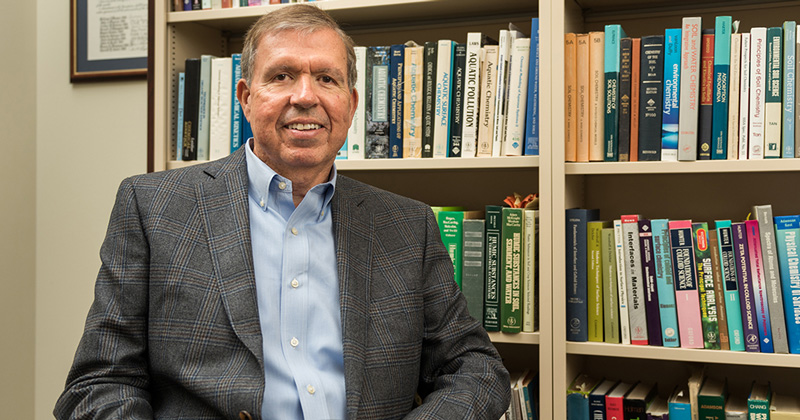


Charting the Earth’s course
Photo by Evan Krape July 07, 2020
Don Sparks, nation’s leading researchers pinpoint investment areas for earth sciences research
As a pioneer in soil sciences research, University of Delaware’s Don Sparks is an icon of earth sciences’ past. Now he’s being asked to guide its future.
Two years ago, the National Science Foundation (NSF) Earth Science Division asked the National Academies of Sciences, Engineering and Medicine’s (NAS) Board on Earth Sciences and Resources to provide input on Earth Science research priorities, infrastructure and facilities and partnerships. Sparks was invited to serve on the Catalyzing Opportunities for Research in the Earth Sciences (CORES) committee to provide a report. The goal is to set priorities and strategies for investments over the next decade that NSF can use to make the largest impact on the planet.
From geologic to biologic, the Earth is full of intertwined, complicated processes. As the human population continues to swell, the need to understand how the Earth sustains both civilization and the planet’s biodiversity becomes more pertinent and urgent.
After surveying the earth science community, town halls, literature reviews of cutting-edge research, reading a litany of white papers, and meetings with representative groups, Sparks and the CORES committee of leading earth scientists zeroed in on 12 research questions that are poised for major advances by 2030. Their guidance was issued in “A Vision for NSF Earth Sciences 2020-2030: Earth in Time,” which addresses everything from the planet’s magnetic field to volcanoes and earthquakes to biodiversity, climate change, the water cycle and the critical zone.
“In the soil sciences, there has never been a more exciting time to address critical research questions and opportunities,” said Sparks. “When I look at all of the great challenges that our world is facing in terms of food insecurity, climate, water security, water quality and contamination, I felt that it is such an important time for me to be involved and share my knowledge on soil sciences research that I’m particularly close to.”
With diverse research backgrounds, Sparks learned a great deal from the CORES committee about areas like plate tectonics and natural disasters.
“For all of the 12 questions, earth sciences research is truly poised not only for scientific advances, but also for the impact the research can have on human society,” Sparks noted. “We want to answer questions that will help our planet and the human race.”
At UD, Sparks fills many roles — Unidel S. Hallock du Pont Chair in Plant and Soil Sciences in the College of Agriculture and Natural Resources, Delaware Environmental Institute (DENIN) director, and Francis Alison Professor of Soil and Environmental Chemistry. His research background has him most curious about how the many reactions and mechanisms in the Earth’s critical zone — a long-time, national initiative of the National Science Foundation. Humans live in this critical zone, the reactive skin of the terrestrial Earth that influences exchanges between the land and atmosphere. Sparks was the principal investigator on one of the very first critical zone observatory projects, partnering with the Stroud Water Research Center. On Earth, soil is a major reservoir of carbon. Sparks and his group have pioneered studies on the complexation mechanisms between soil carbon and minerals. Recently, they have studied how a changing climate is impacting carbon cycling in soils.
So what other areas will the general public see the impact of the course charted by the Earth in Time report?
“Climate change is one of the defining issues of the 21st century,” said Sparks. “In the report, we address important research needs related to extreme events and natural disasters such as flooding, fires, drought, sea level rise, earthquakes and volcanoes. The public is increasingly understanding that these areas are critically important.”
The committee also assessed what advances are needed in infrastructure and facilities, including human infrastructure, to address the scientific questions. They emphasized the need to improve diversity and inclusion in the geosciences, one of the least diverse scientific fields. Additionally, Sparks was heavily involved in looking into what partnerships NSF can form with federal agencies, other research programs and the private sector.
“If you look at agriculture, for example, I see many opportunities to work with the earth sciences to address climate, water and natural disasters issues.”
This effort is far from the first national committee that has leaned on Sparks’ expertise. The UD professor has long been a part of the NAS U.S. National Committee for Soil Sciences (USNC/SS). Its charge is to represent soil scientists across the country to the International Science Council, a non-governmental organization with a global membership of regional, national and international scientific unions and associations.
“The task of the members of the U.S. National Committee for Soil Sciences is to promote areas and issues in soil science which are of national and international importance,” said Sparks. “We promote soil science — the science, the human impacts and the educational aspects.”
The USNC/SS official link to NAS provides additional cachet. When Sparks served as chair of the committee, a workshop was held in Washington, D.C. to highlight to policymakers and the public why soils are so important to the planet and to humanity and the big issues facing society.
The USNC/SS has also been sponsoring travel fellowships for graduate students and early career scientists to attend the World Congress of Soil Science, which is held every four years at locations around the world.
“It gives our students opportunities to interact with leading scientists around the world, many of whom do not regularly attend the U.S.-based soil science meetings,” Sparks said.
Contact Us
Have a UDaily story idea?
Contact us at ocm@udel.edu
Members of the press
Contact us at 302-831-NEWS or visit the Media Relations website

